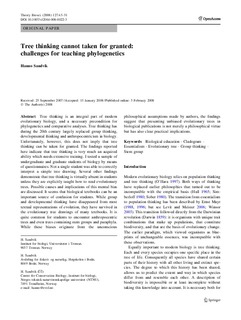| dc.contributor.author | Sandvik, Hanno | |
| dc.date.accessioned | 2015-07-22T12:14:54Z | |
| dc.date.accessioned | 2015-09-01T09:20:48Z | |
| dc.date.available | 2015-07-22T12:14:54Z | |
| dc.date.available | 2015-09-01T09:20:48Z | |
| dc.date.issued | 2008 | |
| dc.identifier.citation | Theory in biosciences 2008, 127(1):45-51 | nb_NO |
| dc.identifier.issn | 1611-7530 | |
| dc.identifier.uri | http://hdl.handle.net/11250/298336 | |
| dc.description.abstract | Tree thinking is an integral part of modern
evolutionary biology, and a necessary precondition for
phylogenetics and comparative analyses. Tree thinking has
during the 20th century largely replaced group thinking,
developmental thinking and anthropocentricism in biology.
Unfortunately, however, this does not imply that tree
thinking can be taken for granted. The findings reported
here indicate that tree thinking is very much an acquired
ability which needs extensive training. I tested a sample of
undergraduate and graduate students of biology by means
of questionnaires. Not a single student was able to correctly
interpret a simple tree drawing. Several other findings
demonstrate that tree thinking is virtually absent in students
unless they are explicitly taught how to read evolutionary
trees. Possible causes and implications of this mental bias
are discussed. It seems that biological textbooks can be an
important source of confusion for students. While group
and developmental thinking have disappeared from most
textual representations of evolution, they have survived in
the evolutionary tree drawings of many textbooks. It is
quite common for students to encounter anthropocentric
trees and even trees containing stem groups and paraphyla.
While these biases originate from the unconscious philosophical assumptions made by authors, the findings
suggest that presenting unbiased evolutionary trees in
biological publications is not merely a philosophical virtue
but has also clear practical implications. | nb_NO |
| dc.language.iso | eng | nb_NO |
| dc.publisher | Springer Verlag | nb_NO |
| dc.relation.uri | http://www.evol.no/hanno/08/ThBiosci.htm | |
| dc.title | Tree thinking cannot taken for granted: challenges for teaching phylogenetics | nb_NO |
| dc.type | Journal article | nb_NO |
| dc.type | Peer reviewed | en_GB |
| dc.date.updated | 2015-07-22T12:14:54Z | |
| dc.subject.nsi | VDP::Matematikk og naturvitenskap: 400::Zoologiske og botaniske fag: 480 | nb_NO |
| dc.subject.nsi | VDP::Mathematics and natural scienses: 400::Zoology and botany: 480 | nb_NO |
| dc.source.pagenumber | 45-51 | nb_NO |
| dc.source.volume | 127 | nb_NO |
| dc.source.journal | Theory in Biosciences | nb_NO |
| dc.source.issue | 1 | nb_NO |
| dc.identifier.doi | 10.1007/s12064-008-0022-3 | |
| dc.identifier.cristin | 356523 | |
| dc.subject.keyword | Fylogeni / Phylogeny | |
| dc.subject.keyword | Vitenskapsfilosofi / Philosophy of science | |
| dc.description.localcode | (C) The Author(s) 2008. Open access articles under the liberal Creative Commons Attribution 4.0 International (CC BY) license. The CC BY license permits unrestricted use, distribution and reproduction in any medium, provided you give appropriate credit to the original author(s) and the source, provide a link to the Creative Commons license, and indicate if changes were made. | nb_NO |
